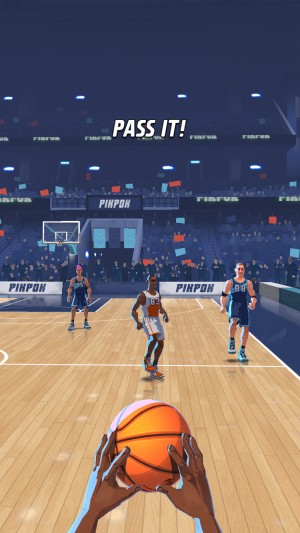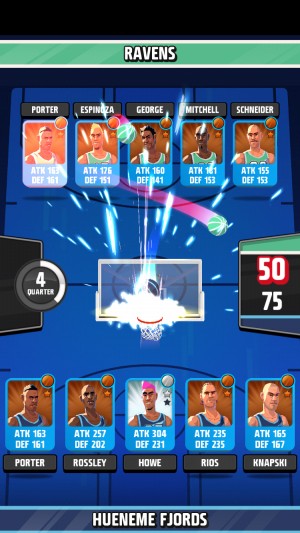 PikPok’s no stranger to making fun games (see the recently released Adventure Xpress (Free)) and with its latest release, the developer has decided to take on the card battler genre. Rival Stars Basketball (Free) takes a simplified card battle formula and infuses it with street basketball style. Rival Stars doesn’t have any significant missteps, but it’s just a bit too shallow in its current state to be anything more than a quick play.
PikPok’s no stranger to making fun games (see the recently released Adventure Xpress (Free)) and with its latest release, the developer has decided to take on the card battler genre. Rival Stars Basketball (Free) takes a simplified card battle formula and infuses it with street basketball style. Rival Stars doesn’t have any significant missteps, but it’s just a bit too shallow in its current state to be anything more than a quick play.
While card battles have a reputation for complexity, Rival Stars Basketball is about as basic as it gets. After setting your five players for a match, Rival Stars pretty much runs on autopilot with both teams scoring baskets. In fact, there’s really only two elements of interaction: Power Plays and Rival Clashes. Power Plays are simple mini-games that have you flicking the screen to pass the ball, steal a pass or take a shot. Successfully completing a Power Play awards a player card and puts your team in a Hot Streak, which means you take (and thus make) more shots during the auto-play sequence. Fail a Power Play and you go ice cold, reducing your scoring capacity. Thus, Power Plays become pretty important, especially in even matches. Winning a match awards fame (leveling up fame replenishes energy and increases your ability to use powerful cards), some card experience, and currency.
 While Power Plays require some element of timing, Rival Clashes are even simpler. Each basketball player has two stats: attack and defense. At random times during a game, the computer will ask you to select a card to attack or defend with (whether you go on offense or defense appears to be random). After you select a card, the computer will then choose one from the opposing team and you go head-to-head with whomever having the higher number winning. Due to the randomness of attack vs defense and the cards being thrown at you, there’s little that can be done in terms of strategy, with the winning move being to brute force wins with upgrading the stats of your cards.
While Power Plays require some element of timing, Rival Clashes are even simpler. Each basketball player has two stats: attack and defense. At random times during a game, the computer will ask you to select a card to attack or defend with (whether you go on offense or defense appears to be random). After you select a card, the computer will then choose one from the opposing team and you go head-to-head with whomever having the higher number winning. Due to the randomness of attack vs defense and the cards being thrown at you, there’s little that can be done in terms of strategy, with the winning move being to brute force wins with upgrading the stats of your cards.
Upgrading stats is done via sacrificing throw-away cards and converting them into experience for your card of choice. The easiest way to do so is to earn cards by successfully completing Power Plays and converting those to experience. While sacrificing cards for experience requires silver coins they are easily earned during normal play. Cards earned during Power Plays can be used early on, but you’ll soon throw them out for rarer cards, which is where the freemium elements come in.
Rival Stars Basketball has both an energy system and premium currency. The energy system puts limits on the amount of matches you can play at any one time before waiting, while the premium currency is used exclusively to purchase rare cards. True, the game’s (currently short) campaign does award some rare cards and small amounts of premium currency, the really good ones are reserved for draft packs which require that hard-to-obtain currency. Players are pushed towards purchasing at least a few draft packs with premium currency in order to have a competitive team and thankfully there’s enough currency eventually doled out to let that happen. However, players looking for the truly rare cards will find themselves buying lots of currency to purchase those draft packs. In regards to the energy system, I didn’t find it too annoying as leveling up replenishes energy and I didn’t find the timer to be too long.
 Gameplay-wise, that’s really all there is to Rival Stars Basketball. Earn (or purchase) some cards, play matches, earn cards during Power Plays, use said cards to upgrade your rarer cards, and use your upgraded cards to advance in the campaign. Since there isn’t much in terms of stats and strategy, it’s really just about getting your attack and defense numbers as high as they can get to beat any of the potential randomness during matches. Sure, you can evolve your rarer cards and spend a long time upgrading them, but in the end it’s all a numbers race (and not even a complex one at that). Even card “special” moves just revolve around attack or defense stats going up in certain circumstances, provided you don’t have a card with a special move that will be unveiled in a later update (a pretty big annoyance).
Gameplay-wise, that’s really all there is to Rival Stars Basketball. Earn (or purchase) some cards, play matches, earn cards during Power Plays, use said cards to upgrade your rarer cards, and use your upgraded cards to advance in the campaign. Since there isn’t much in terms of stats and strategy, it’s really just about getting your attack and defense numbers as high as they can get to beat any of the potential randomness during matches. Sure, you can evolve your rarer cards and spend a long time upgrading them, but in the end it’s all a numbers race (and not even a complex one at that). Even card “special” moves just revolve around attack or defense stats going up in certain circumstances, provided you don’t have a card with a special move that will be unveiled in a later update (a pretty big annoyance).
Rival Stars does have a decent multiplayer experience that’s well built and tailors around playing other players’ teams and stealing points (with premium currency and cards being possible rewards depending on rank). I like the fact that you can choose from a randomized pool of opponents and the game does a good job giving you options in terms of degree of difficulty (with easier opponents awarding less points). Unfortunately, most players will quickly find out that top players all seem to have ultra-rare gold cards (assumedly from paying a small fortune in currency to open draft packs), which basically puts you out of competition unless you’re willing to pay or wait a long time. Gameplay is also exactly the same as the campaign, namely a simple numbers battle without much strategy.
Don’t get me wrong, Rival Stars Basketball isn’t without its charm. While I think the card battling system is too basic for my tastes, it’s highly approachable for newbies. In addition, the art style and overall presentation are pretty cool and the Power Play mini-games are easy to play and look awesome. Unfortunately, I just don’t think it does enough to differentiate itself in the plethora of freemium games in the market. It’s certainly worth checking out but at this point, I don’t think it has enough for long-term viability.